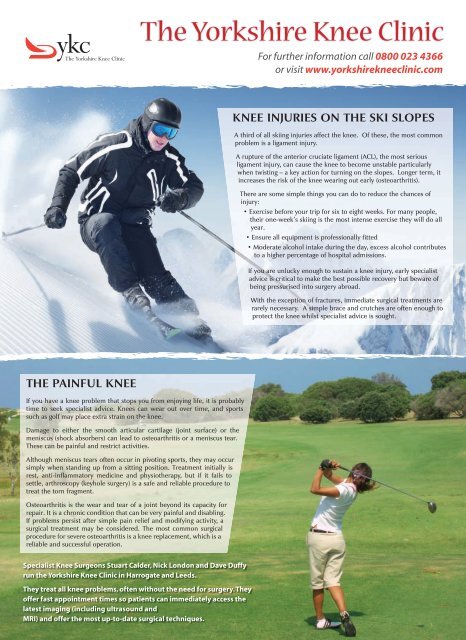november-2011
november-2011
november-2011
You also want an ePaper? Increase the reach of your titles
YUMPU automatically turns print PDFs into web optimized ePapers that Google loves.
ykc The Yorkshire Knee Clinic<br />
THE PAINFUL KNEE<br />
If you have a knee problem that stops you from enjoying life, it is probably<br />
time to seek specialist advice. Knees can wear out over time, and sports<br />
such as golf may place extra strain on the knee.<br />
Damage to either the smooth articular cartilage (joint surface) or the<br />
meniscus (shock absorbers) can lead to osteoarthritis or a meniscus tear.<br />
These can be painful and restrict activities.<br />
Although meniscus tears often occur in pivoting sports, they may occur<br />
simply when standing up from a sitting position. Treatment initially is<br />
rest, anti-inflammatory medicine and physiotherapy, but if it fails to<br />
settle, arthroscopy (keyhole surgery) is a safe and reliable procedure to<br />
treat the torn fragment.<br />
Osteoarthritis is the wear and tear of a joint beyond its capacity for<br />
repair. It is a chronic condition that can be very painful and disabling.<br />
If problems persist after simple pain relief and modifying activity, a<br />
surgical treatment may be considered. The most common surgical<br />
procedure for severe osteoarthritis is a knee replacement, which is a<br />
reliable and successful operation.<br />
Specialist Knee Surgeons Stuart Calder, Nick London and Dave Duffy<br />
run the Yorkshire Knee Clinic in Harrogate and Leeds.<br />
They treat all knee problems, often without the need for surgery. They<br />
offer fast appointment times so patients can immediately access the<br />
latest imaging (including ultrasound and<br />
MRI) and offer the most up-to-date surgical techniques.<br />
The Yorkshire Knee Clinic<br />
For further information call 0800 023 4366<br />
or visit www.yorkshirekneeclinic.com<br />
KNEE INJURIES ON THE SKI SLOPES<br />
A third of all skiing injuries affect the knee. Of these, the most common<br />
problem is a ligament injury.<br />
A rupture of the anterior cruciate ligament (ACL), the most serious<br />
ligament injury, can cause the knee to become unstable particularly<br />
when twisting – a key action for turning on the slopes. Longer term, it<br />
increases the risk of the knee wearing out early (osteoarthritis).<br />
There are some simple things you can do to reduce the chances of<br />
injury:<br />
xercise before your trip for six to eight weeks. or many people,<br />
their one-week’s skiing is the most intense exercise they will do all<br />
year.<br />
nsure all euipment is professionally fitted<br />
oderate alcohol intake during the day, excess alcohol contributes<br />
to a higher percentage of hospital admissions.<br />
If you are unlucky enough to sustain a knee injury, early specialist<br />
advice is critical to make the best possible recovery but beware of<br />
being pressurised into surgery abroad.<br />
With the exception of fractures, immediate surgical treatments are<br />
rarely necessary. A simple brace and crutches are often enough to<br />
protect the knee whilst specialist advice is sought.













